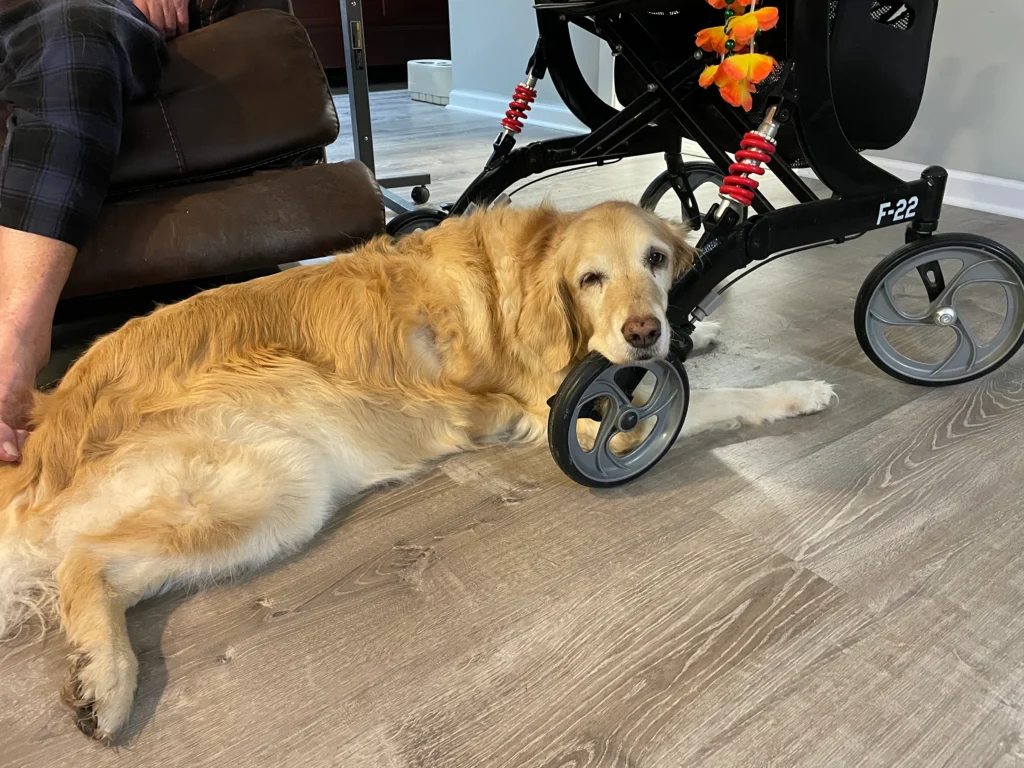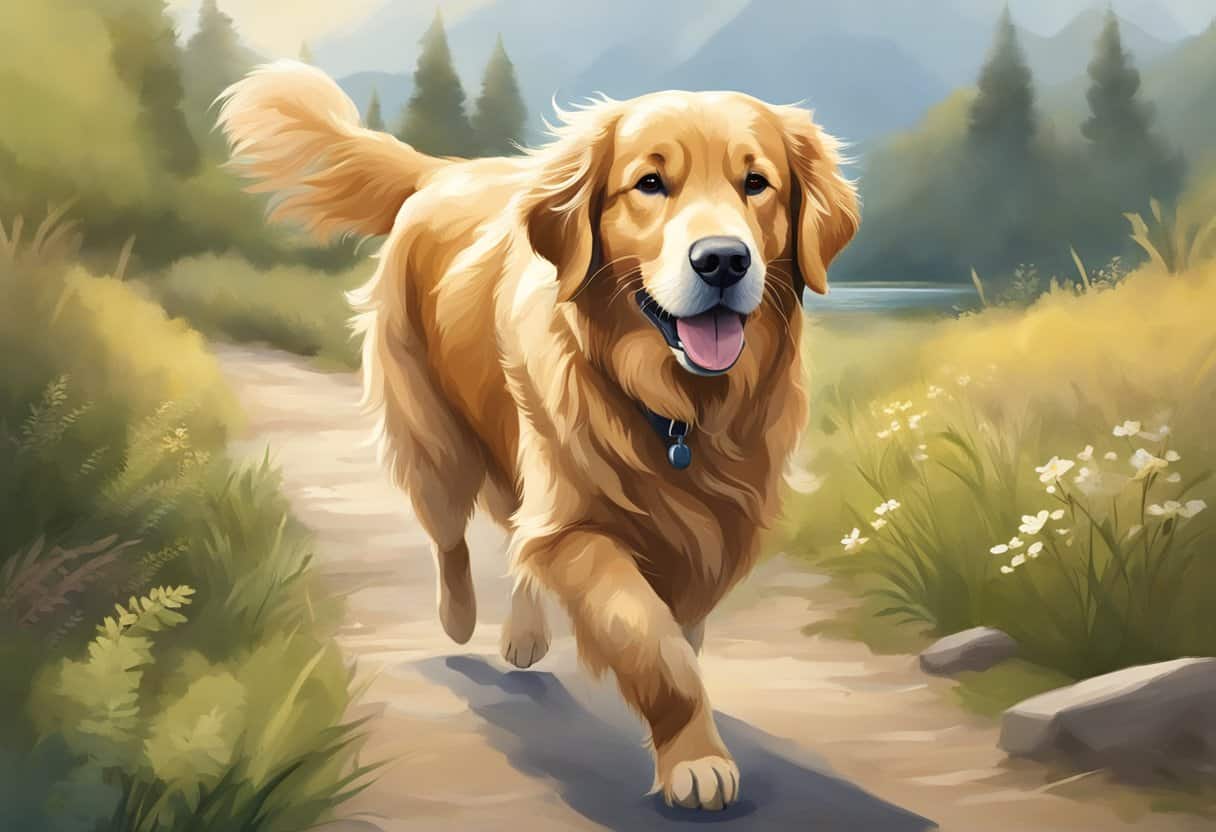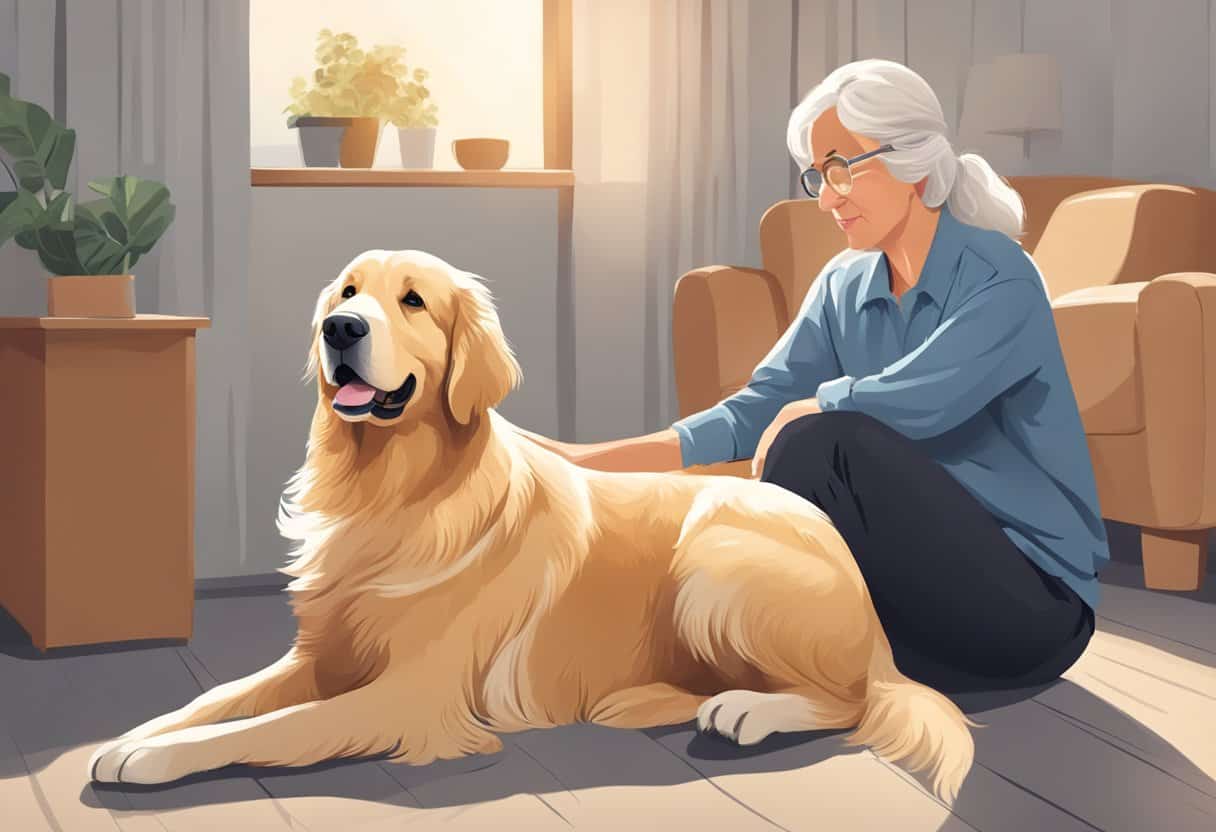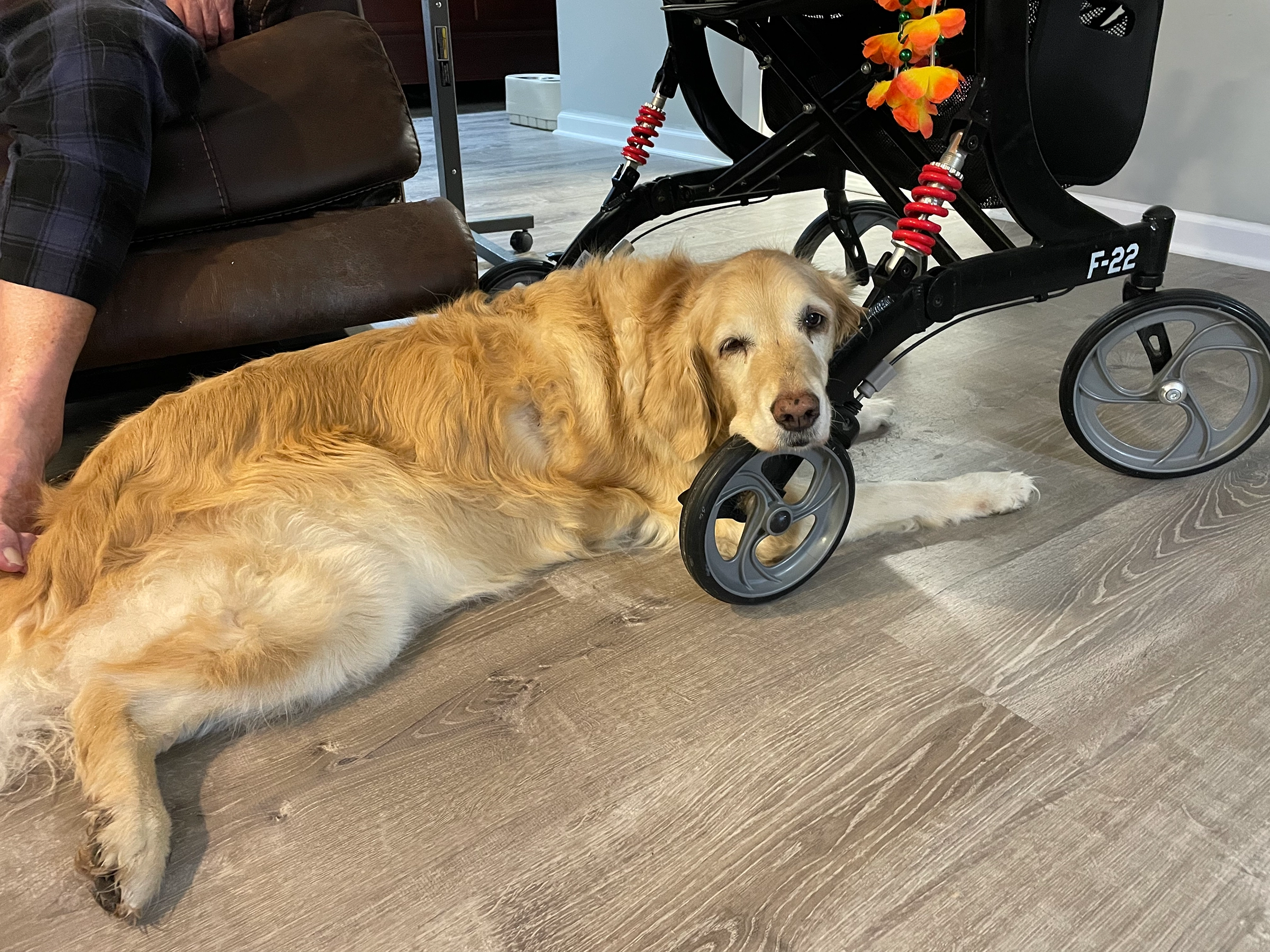This post may contain ads and affiliate links and we may earn a small commission when you click on the links at no additional cost to you. As an Amazon Affiliate, we earn from qualifying purchases. You can read our full disclaimer here.
Golden Retriever Senior Behavior: What to Expect and How to Help

As Golden Retrievers age, their behaviors and needs change. I’ve noticed my senior Golden, Daisy, showing signs of slowing down, with more naps and less interest in long walks.
This shift in behavior is a normal part of the aging process, but it means adopting new ways to keep them comfortable and happy. Daisy is 12 years old now and I find myself, more than ever, treasuring every moment with her.

It’s vital to pay careful attention to any sudden changes in behavior, as these can indicate health issues. For instance, a senior Golden Retriever may become more anxious or exhibit altered eating habits.
These behavioral changes are often subtle, emphasizing the need for close monitoring and regular vet check-ups.
By understanding these changes, I can adapt my care routines to better support my senior Golden’s well-being. This might include providing joint supplements, comfortable bedding, and modifying exercise routines to ensure they remain active yet not overexerted.
Key Takeaways
- Senior Goldens show less energy and more sleep.
- Sudden behavioral changes can signal health problems.
- Regular vet visits and adjusted care routines are essential.
Understanding Golden Retriever Aging Process

Golden Retrievers experience changes as they get older. It’s important to pay attention to these changes and understand how genetics might influence the aging process.
Stages of Life
Golden Retrievers typically go through three primary life stages: puppyhood, adulthood, and their senior years. Puppies are full of energy and grow rapidly during their first year.
Adulthood, from ages 1 to 7, is when they reach their full size and strength. Senior years, starting around 8 years old, often bring about more noticeable changes in their behavior and health.
Genetics and Aging
Genetics play a significant role in the aging process. Some Golden Retrievers may age more gracefully than others due to their genetic makeup.
Health problems such as hip dysplasia or certain cancers can be influenced by genetics. It’s essential to understand your pet’s lineage and keep an eye on potential hereditary issues. Regular vet visits can help monitor and manage these genetic factors effectively.
Signs of Aging in Golden Retrievers
Common signs of aging include graying around the muzzle, cloudy eyes, and behavioral changes such as increased lethargy. You might notice weight gain due to a slower metabolism.
Vision and hearing loss can make senior Golden Retrievers more anxious or confused. Regular check-ups can help manage these symptoms, ensuring your old Golden Retriever enjoys a healthy and happy senior life.
Behavioral Changes in Senior Golden Retrievers
As Golden Retrievers age, they may experience several behavioral changes related to mental stimulation, physical activity, and adapting to new routines.
These changes can be subtle or more pronounced, affecting their daily lives.
Mental Stimulation and Cognitive Function
Senior Golden Retrievers often exhibit changes in cognitive function. Cognitive decline can appear as confusion, forgetfulness, or disorientation in familiar environments.
Cognitive dysfunction syndrome may manifest through decreased responsiveness or engaging less in activities they once enjoyed.
Regular mental stimulation is vital. Simple activities like puzzle toys, gentle exercises, and interactive playtime can help maintain cognitive function.
I’ve noticed that keeping a consistent routine and providing new challenges can make a big difference in their mental agility.
Changes in Physical Activity
Golden Retrievers gradually show signs of slowing down as they age. Energy levels may drop, and they might be less enthusiastic about walks or playtime. You might notice stiff joints or difficulty in movement, making them less active.
Gentle exercises, such as short walks and light play, are essential. This not only keeps their joints flexible but also boosts their spirits.
I find that mixing short periods of activity with longer rest periods helps maintain their physical health without overexerting them.
Adapting to New Routines
Adjusting routines can be crucial for senior Golden Retrievers. As they age, their sleeping patterns often change, sometimes sleeping more during the day and being restless at night. Adapting their daily schedule to accommodate these changes can reduce stress for them.
Introducing changes slowly and maintaining consistent feeding times can help them feel more secure.
I often adjust the environment, like adding ramps for easier access to favorite spots or providing orthopedic beds to support their stiff joints and overall comfort. These adjustments can lead to a happier and more relaxed senior dog.
Health and Wellness for Senior Goldens

Understanding the health and wellness needs of senior Golden Retrievers is essential for ensuring their quality of life.
Addressing common health issues, ensuring regular veterinary care, focusing on balanced nutrition, and maintaining grooming and dental health are crucial.
Common Health Issues
Senior Golden Retrievers often face specific health problems as they age. Arthritis is a frequent concern, affecting mobility and comfort. Joint problems, including hip dysplasia, can also become more pronounced.
Cancer, particularly hemangiosarcoma and lymphoma, is a significant risk.
Kidney disease and heart disease are other critical health issues. Diabetes may develop, often requiring careful monitoring and management.
Recognizing and treating these conditions early can make a big difference in your dog’s longevity and comfort.
Veterinary Care and Early Detection
Regular veterinary visits are key for senior Goldens.
Frequent check-ups allow for early detection of diseases such as cancer, heart disease, and kidney issues. Your vet can provide preventive care, like vaccinations and dental care, ensuring your dog remains healthy.
Early diagnosis and treatment can manage conditions like diabetes, arthritis, and hip dysplasia more effectively.
Establishing a good relationship with your vet helps in proactively managing your Golden’s health.
Nutrition and Weight Management
Proper nutrition is vital for the health of senior Golden Retrievers.
Senior dog food should meet their specific nutritional requirements. A balanced diet includes adequate protein for muscle maintenance, fatty acids for joint health, and carbohydrates for energy.
Weight management is crucial. Obesity can exacerbate joint problems and diabetes.
It’s important to monitor your Golden’s weight and adjust food portions as needed. Consult your veterinarian for recommendations on senior dog food and dietary supplements.
Importance of Grooming and Dental Health
Grooming is not just about appearance; it plays a critical role in a senior dog’s health.
Regular brushing helps maintain the skin and coat health, reducing the risk of skin infections. Bathing should also be done regularly with appropriate dog shampoos.
Dental care is equally important.
Dental issues, such as bad breath, gum disease, and tooth loss, can affect overall health. Routine brushing and professional dental cleanings can prevent these problems.
Good dental hygiene ensures your Golden can enjoy their meals without pain or difficulty.
Managing Discomfort and Mobility
Golden Retrievers tend to experience joint issues as they age, leading to discomfort and reduced mobility.
Addressing these issues involves managing arthritis, aiding movement around the home, and considering appropriate supplements and medications.
Dealing with Arthritis and Stiffness
Golden Retrievers often develop arthritis and stiff joints, making daily activities challenging.
I’ve found regular vet check-ups essential to monitor joint health. Exercise is important, but it should be low-impact to avoid exacerbating pain.
Swimming is a great option because it builds muscle without stressing the joints.
Maintaining a healthy weight is crucial to reduce pressure on joints.
I provide my dog with a balanced diet rich in joint-supporting nutrients like omega-3 fatty acids.
I also consider physical therapy for severe cases, where professionals can use techniques like laser therapy or acupuncture to relieve pain and improve mobility.
Aiding Movement Around the Home
Making my home accessible for my senior Golden Retriever involves a few adjustments.
Ramps can replace stairs to make it easier for my dog to move between levels. I installed non-slip mats in areas with hard flooring to prevent falls and injuries from stiff joints.
An orthopedic bed helps provide the necessary support for aging joints.
I also ensure water and food bowls are elevated to reduce the strain on my dog’s neck and back. By creating a safe and comfortable environment, I can help my pet move around with less discomfort.
Supplements and Medication
Supplements and medication can be key in managing a senior dog’s joint health.
I often look into glucosamine and chondroitin supplements, which support joint repair and reduce inflammation.
Omega-3 fatty acids are another beneficial supplement, known for their anti-inflammatory properties.
I always consult with my vet before starting any new medication or supplement.
In some cases, prescription medications like NSAIDs can manage pain and inflammation effectively.
My vet might also recommend joint injections or other advanced treatments depending on the severity of the condition.
Caring for a Senior Golden Retriever

As our Golden Retrievers age, their needs change. Ensuring they stay comfortable and healthy requires adjusting their environment and activities.
Creating a Comfortable Environment
I make sure my Golden Retriever has a comfortable living space. Orthopedic beds can provide the support they need for aching joints.
Placing non-slip mats around the house can help prevent slips, which are common in geriatric years.
Temperature control is also crucial. Senior dogs are more sensitive to extreme temperatures.
Maintaining a moderate environment inside the house ensures they stay comfortable throughout the year.
A quiet area where they can retreat when they feel tired or anxious is important too.
Golden Retrievers thrive on love and attention, so I always ensure there’s a balance between quiet time and family bonding.
Modifying Exercise and Play
Exercise is still essential but must be adjusted for a senior Golden Retriever. Gentle exercises, like short walks and swimming, help maintain their muscle tone without putting stress on their joints.
Swimming is particularly beneficial as it provides a low-impact way to keep them active.
Regular play is key to keeping their minds sharp and their spirits high.
Although my senior dog might not have the same stamina, using puzzle toys can keep them engaged and mentally stimulated.
Variety is important to prevent boredom and ensure they retain their enthusiasm.
Frequently Asked Questions

As Golden Retrievers age, their behavior often changes in noticeable ways. Here are some common questions I often hear about senior Golden Retriever behavior.
Senior Golden Retrievers may become less active and more prone to napping.
You might notice them being slower on walks and less interested in playing fetch.
They can also become more attached to their routines and exhibit signs of anxiety when these routines are disrupted.
You might face issues like increased barking, house soiling, and restlessness.
Some senior Goldens may show signs of cognitive decline, appearing confused or disoriented at times.
Additionally, they can be less tolerant of stress and change.
Golden Retrievers are typically considered seniors around 8 years old.
Behavioral changes at this stage can include reduced energy, increased anxiety, and changes in sleep patterns.
They may also show less interest in social interactions and develop age-related health issues affecting behavior.
Female Golden Retrievers might exhibit changes due to hormonal shifts, especially if they are unspayed.
They may become more affectionate or sometimes more aloof.
Some females can experience fluctuations in mood and energy levels, particularly if they have conditions affecting their reproductive system.
Regular vet check-ups are crucial for monitoring health.
Offer a comfortable living space with easy access to beds and favorite spots.
Exercise them gently and consistently, and maintain a healthy diet tailored for older dogs.
Consider incorporating mental stimulation through gentle play and interactive toys to keep their minds sharp.
-

Coffee Mug – In Dog Coffees I’ve Only Had One
Price range: $11.95 through $14.95 Select options This product has multiple variants. The options may be chosen on the product page
